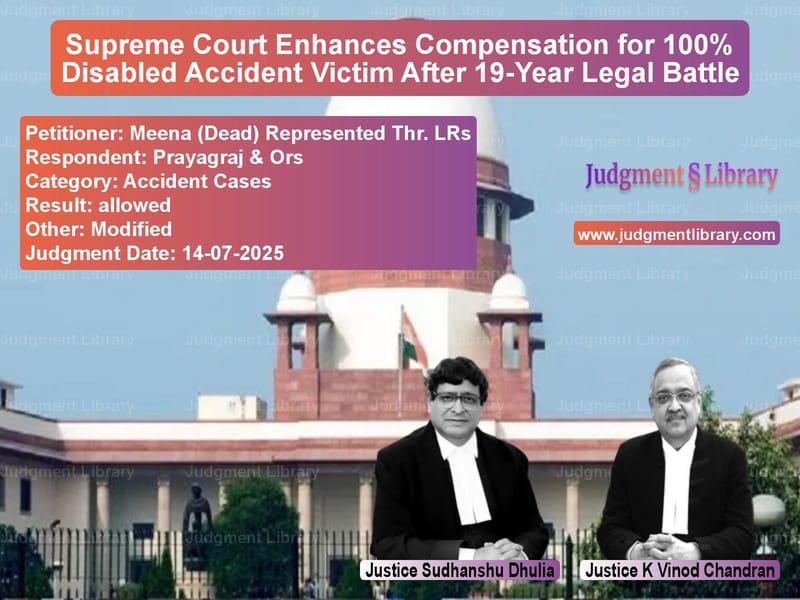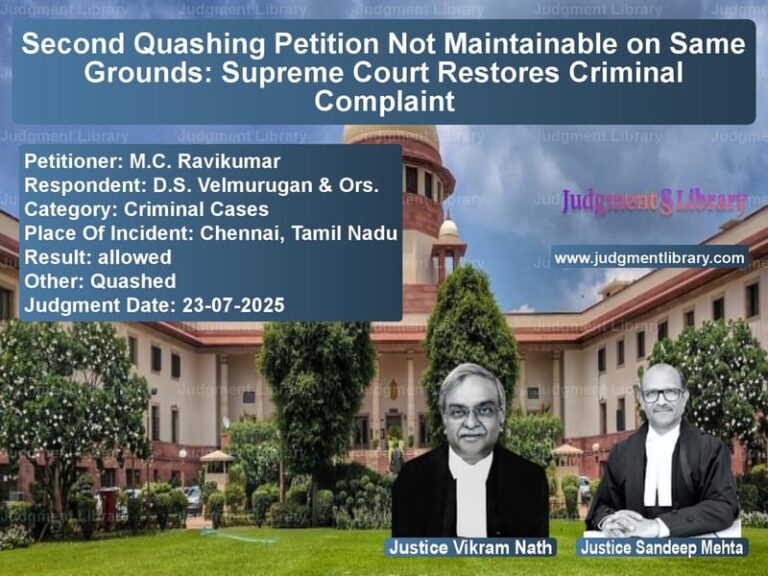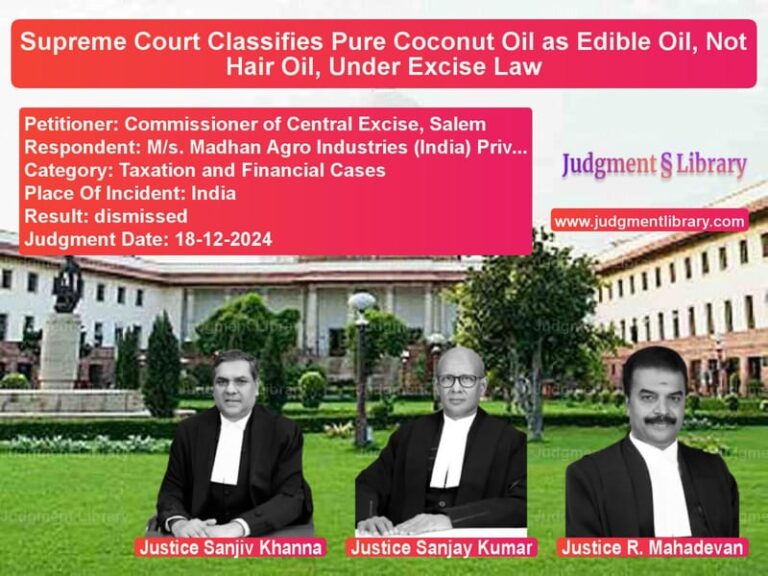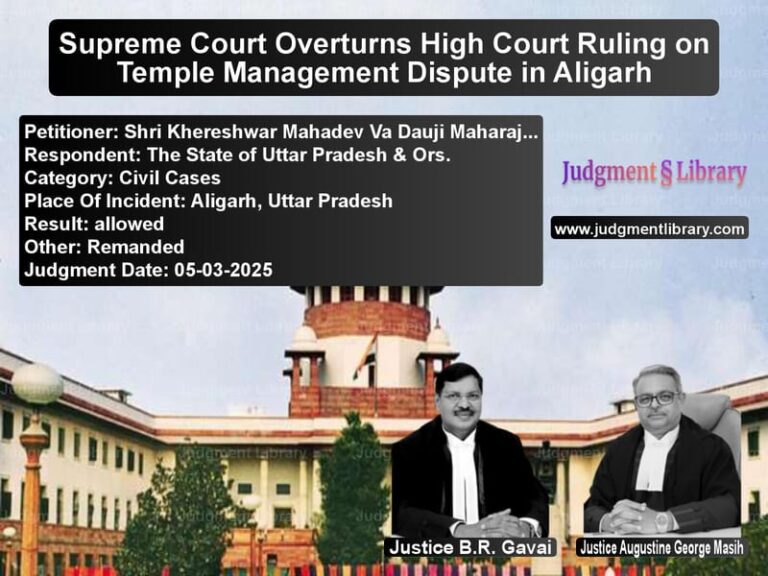Supreme Court Enhances Compensation for 100% Disabled Accident Victim After 19-Year Legal Battle
The pursuit of justice can be a long and arduous journey, especially for those who have suffered life-altering injuries. For Meena, a woman who experienced a catastrophic bus accident that left her with 100% disability, this journey spanned nearly two decades. Her legal battle for adequate compensation continued even after her tragic death, with her family carrying the torch for justice. In a landmark judgment delivered on July 14, 2025, the Supreme Court of India finally brought closure to this prolonged legal saga, enhancing the compensation awarded to her legal heirs and establishing important principles about the rights of accident victims and their families.
The case began on June 4, 2005, when Meena was traveling in a bus and suffered severe injuries in an accident. The medical assessment revealed she had sustained 100% disability, completely altering the course of her life. At the time of the accident, she was 50 years old. The Motor Accidents Claims Tribunal initially computed the compensation, accepting her monthly income as Rs. 3,000 and applying a multiplier of 13. The total loss of income was assessed at Rs. 4,60,000. Additionally, the Tribunal awarded Rs. 50,000 for pain and suffering, Rs. 1,20,000 for attendant charges, Rs. 1,68,970 for medical expenses based on actual bills produced, and Rs. 50,000 for nutritional and transportation needs, bringing the total compensation to Rs. 8,56,970.
The High Court later marginally enhanced this amount by awarding Rs. 50,000 for pain and suffering and Rs. 1 lakh each towards loss of amenities and future medical treatment. However, this still fell short of providing comprehensive compensation for the immense suffering and lifelong challenges faced by Meena.
Tragically, Meena passed away on January 25, 2024, during the pendency of the appeal before the Supreme Court. Her husband and two daughters, as her legal heirs, were substituted as appellants to continue the legal battle. This raised an important legal question: could the legal representatives of a deceased injured person pursue the claim for enhancement of compensation?
The legal heirs relied on the precedent set in Oriental Insurance Company Limited v. Kahlon @ Jasmail Singh Kahlon to assert their right to continue the claim. The Supreme Court, in its judgment, addressed this crucial issue with clarity and compassion. The Court stated: “The learned counsel for the claimants relied on Oriental Insurance Company Limited v. Kahlon @ Jasmail Singh Kahlon to impress upon us that despite the death of the injured, the legal representatives of the deceased can pursue the claim since the property under the Act would have a much wider connotation than the conventional definition and would include the estate left behind by the deceased. It was held that if the legal heirs can pursue claims in case of death, there is no reason to prohibit the legal representatives to pursue claims for loss of a property, akin to estate of the injured, if the injured dies subsequently. We see, absolutely no reason to differ from the declaration of law and the insurer also raises no objection on the same.”
This reasoning established that the legal heirs had every right to pursue the claim, as the compensation sought would have accrued to Meena’s estate and compensated for the loss caused by the accident. The Court further elaborated: “We would consider the enhancement sought by the original applicant, which if granted before her death would have accrued to her estate or rather compensated the loss of her estate; caused by reason of the accident, which the legal heirs are entitled to succeed to.”
When it came to assessing the compensation, the Supreme Court made several important observations. The Tribunal and High Court had adopted a monthly income of Rs. 3,000 for Meena, a married woman without regular employment. It was asserted before the Tribunal that she was carrying on stitching and embroidery work, which the Tribunal refused to accept, finding no evidence led. However, the Supreme Court took a more comprehensive view of the situation, particularly considering the long duration of Meena’s suffering.
The Court noted: “We are also of the opinion that considering the fact that the appellant (deceased) had survived almost 19 years in a vegetative state and there are medical bills produced for treatment undergone subsequently, all of which cannot be said to be a direct consequence of the accident, there is scope for further enhancement. In any event, an additional amount of Rs.1 lakh for future treatment would suffice.”
The Supreme Court recalculated the compensation under various heads, resulting in a significant enhancement. The revised compensation breakdown included: Medical bills of Rs. 1,68,970; Special diet and transport charges of Rs. 50,000; Pain and suffering of Rs. 1,00,000; Loss of amenities of Rs. 1,00,000; Future treatment of Rs. 2,00,000; Attendant charges of Rs. 1,20,000; and Loss of income calculated as 3000 x 110% x 12 x 13 amounting to Rs. 5,14,800. The total compensation awarded was Rs. 12,53,770.
The Court directed that the remaining amount, after deducting what had already been paid to the claimant, should be paid to the legal heirs within two months. The judgment specified: “The legal heirs of the claimant shall provide the separate account details to the insurance company to which accounts the insurance company shall deposit the amount, online, as directed above within the stipulated period with interest as directed by the Tribunal.”
This judgment represents a significant step forward in the jurisprudence surrounding motor accident claims, particularly in cases where the injured person dies during the pendency of proceedings. The Supreme Court’s recognition that legal heirs can pursue enhancement claims ensures that the rights of accident victims are protected even after their death, and that adequate compensation is provided for the immense suffering and financial losses endured.
The Court’s approach in this case demonstrates a humane understanding of the realities faced by accident victims and their families. By considering the nearly two decades that Meena survived in a vegetative state and the subsequent medical treatments, the Court acknowledged that the consequences of such severe accidents extend far beyond the immediate aftermath. The enhanced compensation, while it cannot undo the suffering, provides meaningful financial support to the family that cared for Meena through her prolonged illness.
This judgment also serves as an important reminder about the value of unpaid domestic work and contributions made by women like Meena, who engaged in stitching and embroidery work. While the Court didn’t specifically enhance the income assessment, the overall compensation enhancement reflects a recognition of the economic value of such work and the profound loss suffered when such earning capacity is completely destroyed.
The Supreme Court’s decision to allow the legal heirs to continue the claim establishes an important legal principle that will benefit countless families in similar situations. It ensures that insurance companies and liable parties cannot escape their responsibility merely because the victim passes away during legal proceedings. This protection of victims’ rights, even beyond their lifetime, represents a significant advancement in access to justice for accident victims and their families.
As the legal heirs of Meena finally receive the enhanced compensation after a 19-year legal battle, this judgment stands as a testament to the perseverance of ordinary citizens seeking justice against formidable odds. It also reinforces the judiciary’s role as the ultimate protector of citizens’ rights, ensuring that compensation reflects not just the immediate medical costs, but the comprehensive impact of life-altering accidents on victims and their families.
Petitioner Name: Meena (Dead) Represented Thr. LRs.Respondent Name: Prayagraj & Ors.Judgment By: Justice Sudhanshu Dhulia, Justice K Vinod Chandran.Judgment Date: 14-07-2025.Result: allowed.
Don’t miss out on the full details! Download the complete judgment in PDF format below and gain valuable insights instantly!
Download Judgment: meena-(dead)-represe-vs-prayagraj-&-ors-supreme-court-of-india-judgment-dated-14-07-2025.pdf
Directly Download Judgment: Directly download this Judgment
See all petitions in Road Accident Cases
See all petitions in Compensation Disputes
See all petitions in Motor Vehicle Act
See all petitions in Negligence Claims
See all petitions in Insurance Settlements
See all petitions in Judgment by Sudhanshu Dhulia
See all petitions in Judgment by K. Vinod Chandran
See all petitions in allowed
See all petitions in Modified
See all petitions in supreme court of India judgments July 2025
See all petitions in 2025 judgments
See all posts in Accident Cases Category
See all allowed petitions in Accident Cases Category
See all Dismissed petitions in Accident Cases Category
See all partially allowed petitions in Accident Cases Category







